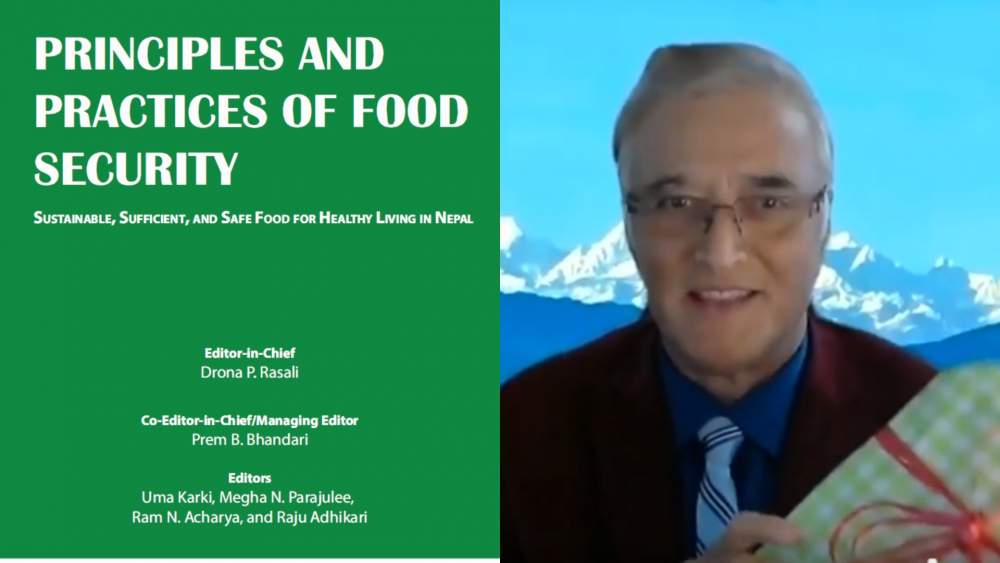

Press Release: August 05, 2020
Association of Nepalese Agricultural Professionals of Americas (NAPA) virtually launched its highly scholarly and resourceful FIRST book entitled “Principles and Practices of Food Security: Sustainable, Sufficient and Safe Food for Healthy Living in Nepal” on August 1, 2020. NAPA conceptualized the publication of a seminal book on food security four years ago.
NAPA is a non-profit, non-governmental, non-religious, and non-political professional organization of agricultural and allied sciences. It was founded in 2016 with the mission to foster human welfare and environmental health through scientific and socio-economic innovation, developmental initiatives, capacity building, knowledge sharing, and charitable activities. With the great support and participation from members and well-wishers, NAPA has, within four years of its establishment, evolved as a vibrant and impactful professional organization, conducting teaching, research, outreach, policy advising, workshops, symposia, scientific publications, and international conferences.

Despite it being a voluntary professional association, the editorial board (refer to green cover page) along with several dedicated and committed professionals contributed resolutely to make this publication possible, when the importance of food security has been more challenging globally due to COVID-19 pandemic. The sustainability, sufficiency, safety and healthy foods, affordability, and rights to access them are essential aspects of food security in the 21st century, constituting the key components of a complex food system in Nepal. This book is underpinned in this principle.
The 424-page book has eighteen chapters, including one comprehensive introductory chapter that sets the stage for the scope of this book. The remaining 17 chapters are divided into four broad sections: i) general and socio-economic issues of food security; ii) sustainable agricultural production for food security; iii) food safety regulations, healthy eating, and climate change impacts; and iv) promising technologies of specialty.
NAPA believes that this book is an excellent resource for everyone with some stake in agricultural and allied disciplines but is expected to serve as a food security compendium for: i) planners, policymakers, decision makers, implementers, and field workers at various levels of the governments; ii) non-governmental organizations; iii) agriculture producers and private industries engaged in agricultural and allied sciences; iv) food industries, producers, retailers, and suppliers, v) faculty and students of food security and food systems, and agriculture related disciplines at universities and colleges; and vi) civic leaders and intellectuals.

The book offers knowledge from wide-ranging information sources closely related to food security in terms of securing sustainable production and access to food, and sufficiently available and safely prepared food for healthy living. The chapters in the book have been written by 49 nationally and internationally engaged authors and co-authors in the areas of food security across the globe. Most of these authors not only have knowledge of the subject matter, but they also have firsthand experience of the prevailing complex food security situation in Nepal and beyond.
In the presence of a virtual global audience, Dr. Nanda Prakash Joshi (pictured), NAPA Advisor and Director of WorldTAP Food Safety Program at Michigan State University launched the book. Please visit NAPA Book Launch Program if you are interested in viewing the Book Launch Ceremony. Dr. Prem B. Bhandari, Co-Editor-in-Chief and Managing Editor moderated the Book Launch program, while Editor-in-Chief Dr. Drona P. Rasali highlighted the scope and implication of the book, and Editor Dr. Uma Karki delivered the welcome remarks. Similarly, Dr. Devendra Gauchan from Nepal and Dr. Luni Piya from Japan shared their experiences on behalf of reviewers and authors, respectively. While offering a vote of thanks, Dr. Lila B. Karki, NAPA Immediate Past President, reviewer, and co-author expressed his sincere appreciation and gratitude to the previous two executive committee officials, book editorial board, authors and co-authors, reviewers, foreword writers, testimonial providers, plagiarism checkers, copy editors, print house, family members, and current executive committee officials. Dr. Karki also shared that the four-year book project journey was full of challenges but also presented valuable opportunities and a great learning experience for future publication projects.
Delivering closing remarks, NAPA President Dr. Megha N. Parajulee recalled the book publication journey as an author, editor, reviewer, and NAPA official, and emphasized the enormity of the book project for a newly established organization, NAPA, and its commitment to achieve this goal. He also thanked all contributors who made the publication possible and expressed a commitment of support for future publication projects. The book publication is also expected to complement NAPA’s peer-reviewed publication of Global Journal of Agricultural and Allied Sciences (GJAAS).
The books are available at different bookstores and locations in Kathmandu, Nepal. Interested individuals can email [email protected] to order the book. Details of the book content, pricing, and distribution policy are available at NAPA Website. You may visit NAPA Website for the details.
Comment